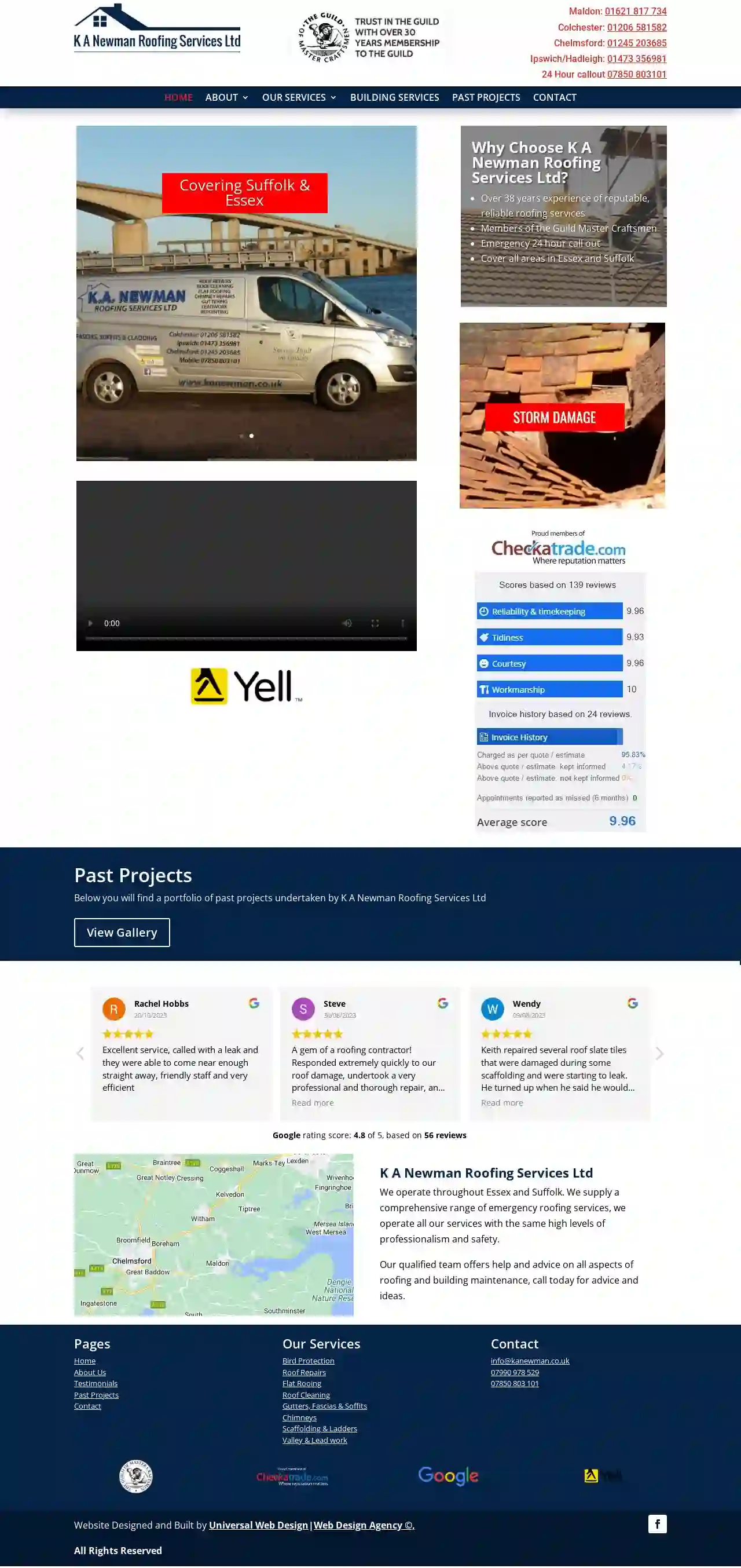Roofing Companies Middleton
Find top Roofing Company in Middleton
Receive 3 FREE Roofing Company quotes for your project today! Compare profiles, reviews, accreditations, portfolio, etc... and choose the best service.

Thatching by Brad Young
55 reviewsBury, GBWith over 30 years experience as a second generation Master Thatcher in the Salisbury & surrounding area, I proudly provide a comprehensive, bespoke service that meets the needs of you, the customer. My passion, professionalism & friendly nature is why I am trusted by many loyal customers to tend to their roof again & again. As a highly skilled craftsman with a meticulous eye for detail, I have built myself a strong reputation for thatching to the highest of standards with the best quality materials available whilst keeping you informed throughout the process of thatching. I always strive for reliability, tidiness & customer satisfaction all at a competitive price!
- Services
- Why Us?
- Our Team
- Testimonials
- Gallery
Get Quote
K.H. Roofing
514 reviewsRegency Court, Deansgate, 62-66 Regency Court, Manchester, M3 2EN, GBK.H. ROOFING is a family-run roofing contractor based in Manchester, serving the North West region for the past 10 years. We pride ourselves on providing top-quality roofing services at affordable prices, with a focus on three key targets: efficiency, competitive pricing, and exceptional workmanship. Our commitment to customer satisfaction is evident in our reputation for consistently happy clients, with much of our business stemming from word-of-mouth referrals. We understand that a roof is a crucial part of your home, and we strive to ensure our customers have peace of mind. Our experienced team is available 24/7 to address any concerns and provide prompt assistance, whether it's a minor repair or a major project. We offer a wide range of services, including free consultations, repairs, maintenance, flat roof installation, slating and tiling, roof replacement, and fascia and guttering services. We use high-quality materials and guarantee our workmanship for 15 years, with some roofs lasting up to 50 years with proper maintenance.
- Services
- Why Us?
- Accreditations
- Our Team
- Testimonials
- Gallery
Get Quote
K A Newman Roofing Services Ltd
4.855 reviewsBury, GBK A Newman Roofing Services Ltd is a reputable and reliable roofing company with over 38 years of experience. We operate in Essex and Suffolk, covering all areas, and offer a comprehensive range of roofing services. Our team of qualified professionals provides help and advice on all aspects of roofing and building maintenance. We are members of the Guild Master Craftsmen and offer an emergency 24-hour call-out service. Our services include bird protection, roof repairs, flat roofing, roof cleaning, gutters, fascias, and soffits, chimneys, scaffolding, and ladders, and valley and lead work. We have a portfolio of past projects and a team of experts who are dedicated to providing excellent customer service.
- Services
- Why Us?
- Our Team
- Testimonials
- Gallery
Get Quote
Wright Choice
c/o shire conservatories, unit 6 Harlescott barns, Shrewsbury, SY1 3SY, GBWright Choice is a roofing company based in Shrewsbury, Shropshire, with over 20 years of experience. They offer a range of services including flat roofing, roofline work, and handyman services. The company prides itself on providing free roof inspections and no-hassle written quotes. They serve customers throughout Shrewsbury and surrounding areas.
- Services
- Why Us?
- Gallery
Get Quote
R G Hinds Roofing Ltd
51 reviewsGreen Lane, Upper Road, Meole Brace, SY3 9JH, GBEstablished in 1980 by Robert Hinds (Bob), RG Hinds Roofing Ltd has stood the test of time in the uncertain building industry. We believe this speaks for itself when confirming our reliable service and competitive prices. We employ specialists in all aspects of premium roofing, from prestigious re-roofs like (Shrewsbury Abbey) to hat roofing and detail leadwork. Whatever your roofing needs we believe we hold the solution. We pride ourselves in a friendly, personal service so whatever your problem, pickup the phone or send us an email and we will be glad to help. or for all enquires please call 01743 360555
- Services
- Why Us?
- Gallery
Get Quote
Adm roofing services ltd
511 reviews10 Ferndale, Hyde, SK14 4GP, GBADM Roofing Services is a specialist roofing company based in Hyde, Manchester, with over 20 years of experience in the industry. We pride ourselves on providing high-standard roofing work with quality roofing materials, using the latest products and advanced techniques. Our team of experienced tradesmen can handle all types of roofing projects, including roofing, slating, felting, tiling, dormers, Velux windows, and guttering. We are fully insured and committed to delivering exceptional customer service. Our customers can expect a reliable and honest service, with clear communication throughout the project. We are proud of our reputation and strive to maintain it by providing the highest level of craftsmanship and attention to detail.
- Services
- Why Us?
- Accreditations
- Our Team
- Testimonials
- Gallery
Get Quote
Just Property Care ltd
549 reviewsLondon, UK, 123 Main Street, SW1A 1AA, GBJust Property Care Ltd is a family-run business with over 15 years of experience in providing a wide range of property maintenance and repair services. Our team of experts is fully accredited and insured, ensuring that all work is carried out to the highest standards. We pride ourselves on our commitment to customer satisfaction, and our reputation for delivering exceptional results has earned us a 5-star rating on Checkatrade.
- Services
- Why Us?
- Accreditations
- Our Team
- Testimonials
Get Quote
P N W Roofing Ltd
51 reviewsBuckley, 35 Megs Lane, CH7 2AE, GBPolyroof is the current market leader in fiberglass roofing. We offer a professional service to all areas of the flat roofing market, including private and commercial projects, new builds and renovation work, covering the northwest and north Wales area. With over 16 years of experience, we have provided Polyroof flat roofing services for private and commercial customers throughout Cheshire, Wrexham and North Wales. We've got you covered with our suitable solutions for both refurbishment and new build applications, waterproofing everything from porches and dormers to extensions and garage roofs. Our fully trained and approved Polyroof installation contractors can provide attractive, waterproof, low maintenance and cost effective flat roofing solutions.
- Services
- Why Us?
- Accreditations
- Our Team
- Gallery
Get Quote- Sr
Srd Roofing Limited
53 reviewsStockport, GB- Services
- Why Us?
- Gallery
Get Quote 
Roofers Altrincham
51 reviews58 Old Crofts Bank, Greater Davyhulme, Urmston, M41 7AB, GBRoofers Altrincham is a family-run roofing company serving Altrincham and the surrounding areas. With many years of experience in the industry, they pride themselves on their hard work, reliability, and excellent customer service. They offer a complete range of roofing services, including new roofs, flat roofs, roof repairs, gutters, fascias, soffits, chimneys, and dry verges & dry ridges. Roofers Altrincham uses the very best materials and ensures customer satisfaction with every project. They are available 24/7 for roof repairs and encourage customers to contact them for a free, no-obligation quote.
- Services
- Why Us?
- Gallery
Get Quote
Over 12,314+ Roofers registered
Our roofing experts operate in Middleton and surroundings!
Roofyng.co.uk has curated and vetted the Best Roofing Companies in Middleton. Find the most trustworthy business today.
Frequently Asked Questions About Roofing Companies
- Experience: 'How long have you been in business, and what experience do you have with similar projects?'
- Licensing and insurance: 'Are you licensed and insured, and can I see proof of coverage?'
- Warranties: 'What warranties do you offer on your work and the materials used?'
- References: 'Can you provide references from past clients?'
- Project Timeline: 'What is the estimated timeline for completing the project?'
- Payment Terms: 'What are your payment terms, and do you require a deposit?'
- Communication: 'How will you keep me updated on the project's progress?'
- Cleanup: 'What steps will you take to protect my property during the project and ensure proper cleanup afterward?'
- Roof size and complexity
- Roofing material chosen
- Local labor costs
- Accessibility of the roof
- Removal of existing roofing
- Additional features (skylights, chimneys, etc.)
- Leaks or Water Stains: Water stains on ceilings or walls, dripping water, or dampness in the attic.
- Missing, Cracked, or Curled Shingles: Inspect for damaged or missing shingles, especially after a storm.
- Damaged Flashing: Look for rust, corrosion, or gaps in flashing around chimneys, vents, or skylights.
- Sagging or Uneven Rooflines: A sagging roof could indicate structural problems.
- Granule Loss: Excessive granules in gutters suggest aging asphalt shingles.
- Moss or Algae Growth: Can trap moisture and damage roofing materials.
What questions should I ask a roofing contractor?
How much does a new roof cost in the UK?
What are some common signs of roof damage?
What should I do with my old roof after replacement?
What questions should I ask a roofing contractor?
- Experience: 'How long have you been in business, and what experience do you have with similar projects?'
- Licensing and insurance: 'Are you licensed and insured, and can I see proof of coverage?'
- Warranties: 'What warranties do you offer on your work and the materials used?'
- References: 'Can you provide references from past clients?'
- Project Timeline: 'What is the estimated timeline for completing the project?'
- Payment Terms: 'What are your payment terms, and do you require a deposit?'
- Communication: 'How will you keep me updated on the project's progress?'
- Cleanup: 'What steps will you take to protect my property during the project and ensure proper cleanup afterward?'
How much does a new roof cost in the UK?
- Roof size and complexity
- Roofing material chosen
- Local labor costs
- Accessibility of the roof
- Removal of existing roofing
- Additional features (skylights, chimneys, etc.)
What are some common signs of roof damage?
- Leaks or Water Stains: Water stains on ceilings or walls, dripping water, or dampness in the attic.
- Missing, Cracked, or Curled Shingles: Inspect for damaged or missing shingles, especially after a storm.
- Damaged Flashing: Look for rust, corrosion, or gaps in flashing around chimneys, vents, or skylights.
- Sagging or Uneven Rooflines: A sagging roof could indicate structural problems.
- Granule Loss: Excessive granules in gutters suggest aging asphalt shingles.
- Moss or Algae Growth: Can trap moisture and damage roofing materials.